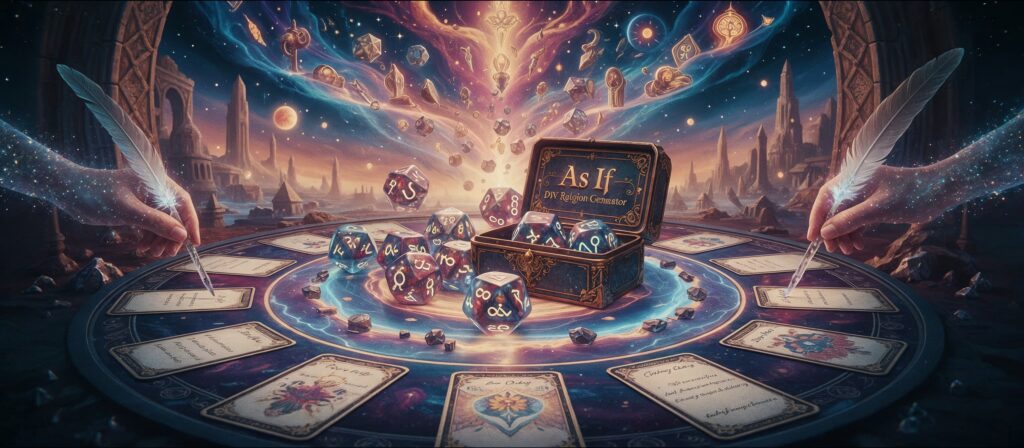Continuing the little riff I’m on around generativity as a broad phenomenon and concept rather than something specific to AI, here’s something I concocted earlier this year. If it’s not immediately apparent, I was reading some Pratchett and other stuff around tech-mysticism and fake religions. It fits into my usual worldbuilding-type shtick: instructions/a template to roll up your own religion/faith/spiritual tradition, complete with deity, commandments, and sacred texts.
I’ve run through this a few times, resulting in…
The Followers of the Radiant Zindle Biscuit, a luminous and fragile deity who is possibly made of shortbread. One of their sacred texts is the Parable of the Cautious Dunk, which reads as follows:
The Biscuit once met the Milk.
The Seer had warned them.
“Why avoid me?” asked the Milk.
“Because I will crumble,” said the Biscuit.
And yet, side by side they stood.
And it wasn’t too bad, all things considered.
Also, The Followers of the Glorious Mungus Orb, whose devotees must count all the spoons in the house, then carry this number with them for a whole week. Furthermore, dictionaries are forbidden unless it’s your birthday, and teeth must be buried.
I took this later one a little further and thought about who might be involved in such a faith. From this emerged Moon-Sister Margle, who confiscates dictionaries throughout the year, but gives you a specially chosen one on your birthday. There’s also Buck Stapleton, a self-appointed GMO preacher (influencer) and webmaster of the Unofficial Glorious Mungus Orb Online Portal (UGMOOP) — the Portal displays a Live Spoon Tracker that counts every spoon Buck has seen since 2001.
Aaaaaaanyway. Give it go! Have fun!

‘As If’ is a solo roll-and-write ritual for building a faith that is definitely real.
To build your faith, you’ll need 3D6, a standard deck of playing cards, and probably something to write with and on.
Opening Scroll
You are the last in a long line of clerics.
The previous cleric — the one who was supposed to teach you everything — has perished in an unfortunate incident involving…
Roll 1D6
| Roll | Incident |
|---|---|
| 1 | sacramental wine and a building site |
| 2 | a wager with ne’er-do-wells in the tavern |
| 3 | one too many of the cook’s crème éclairs |
| 4 | an unsupervised baptism in the town fountain |
| 5 | three goats, a ladder, and bad timing |
| 6 | a failed attempt to canonise a loaf of bread |
All that remains is this DIY religion kit. With its fragments and a few rolls of the dice, you must recreate the town’s central belief system and have it ready for next week’s… well, whatever the worship session is called. That’s your job to figure out.
Game Structure Overview
1. Generate Deity
2. Commandments Phase
- Generate Commandment 1
- Generate Commandment 2
- Generate Commandment 3
- Create Sacred Symbol #1
- Generate Commandment 4
- Generate Commandment 5
- Generate Commandment 6
- Create Sacred Symbol #2
3. Ritual Texts Phase
- Generate Psalm 1
- Generate Psalm 2
- Generate Psalm 3
- Generate Psalm 4
- Create Sacred Symbol #3
4. Found the Faith
- Name the Faith
- Perform the Consecration Rite
- Begin faith duties
Each session produces:
- 1 Deity
- 6 Laws
- 4 Psalms
- 3 Symbols
- 1 Faith Name
- 1 Household Object that is now very sacred
Step 1: Generate Your Deity
Roll 3D6, one per table.
Descriptor
| Roll | Descriptor |
|---|---|
| 1 | Glorious |
| 2 | Whispering |
| 3 | Stubborn |
| 4 | Infinite |
| 5 | Sticky |
| 6 | Radiant |
Nonsense Word
| Roll | Word |
|---|---|
| 1 | Wibber |
| 2 | Plonk |
| 3 | Zindle |
| 4 | Borp |
| 5 | Greeble |
| 6 | Mungus |
Sacred Form
| Roll | Form |
|---|---|
| 1 | Gopher |
| 2 | Orb |
| 3 | Soup or Biscuit (you choose) |
| 4 | Blimp |
| 5 | Goat |
| 6 | Cone |
Result: e.g. The Radiant Mungus Cone
Step 2: Generate 6 Commandments
For each Commandment:
1. Roll 2D6 for the Template
| Roll | Template |
|---|---|
| 2 | One must always _ |
| 3 | You shall keep _ sacred |
| 4 | Never be caught _ |
| 5 | Let no _ go un_ |
| 6 | Thou shalt not _ |
| 7 | The faithful shall _ |
| 8 | _ is forbidden unless _ |
| 9 | To _ is to honour the divine |
| 10 | _ is only allowed when _ |
| 11 | All _ must be before __ |
| 12 | _ shall pass, except when _ |
2. Generate the Action
Choose Card Method or Dice Table Method.
Card Method
- Suits = Verb Types
| Suit | Verb Type |
|---|---|
| ♠ | sense (see, hear, smell) |
| ♥ | emotion (love, fear, worry) |
| ♣ | movement/action (carry, wave, wear) |
| ♦ | abstract/social (swear, trade, confess) |
- Ranks = Noun Types
| Rank | Noun Type |
|---|---|
| 2–5 | body-related |
| 6–9 | everyday objects |
| 10–A | weird/ritual items |
→ “Fear socks,” “Confess to shadows,” etc.
Dice Table Method
Verb (2D6)
| Roll | Verb |
|---|---|
| 2 | whisper to |
| 3 | point at |
| 4 | avoid |
| 5 | clean |
| 6 | protect |
| 7 | wear |
| 8 | feed |
| 9 | bury |
| 10 | count |
| 11 | fear |
| 12 | imitate |
Noun (2D6)
| Roll | Noun |
|---|---|
| 2 | doorways |
| 3 | frogs |
| 4 | soup |
| 5 | shadows |
| 6 | spoons |
| 7 | socks |
| 8 | mirrors |
| 9 | teeth |
| 10 | whispers |
| 11 | clouds |
| 12 | dictionaries |
3. Roll 2×1D6 for Qualifier
Qualifier Phrase
| Roll | Phrase |
|---|---|
| 1 | except on |
| 2 | unless it’s |
| 3 | only during |
| 4 | while under |
| 5 | unless your |
| 6 | particularly if |
Qualifier Condition
| Roll | Condition |
|---|---|
| 1 | your birthday |
| 2 | a full moon |
| 3 | the soup is boiling |
| 4 | your socks are damp |
| 5 | someone is watching |
| 6 | you ate beans in the last week |
Step 3: Generate 4 Psalms / Ritual Texts
Roll 1D6 for each Psalm:
| Roll | Psalm Type |
|---|---|
| 1 | Hymn (praise/poetic tone) |
| 2 | Liturgical Instruction (ritual guidance) |
| 3 | Parable or Myth (short tale with a possible lesson) |
| 4 | Blessing (absurd/hopeful encouragements) |
| 5 | Repetition (one phrase, three variations) |
| 6 | Weekly Task (a divine errand or dare) |
Optional Card Inspiration
- Suit = theme
♠ nature — ♥ emotion — ♣ object nearby — ♦ abstraction - Colour = tone
Red = joyful/absurd
Black = eerie/cryptic
Step 4: Create 3 Sacred Symbols
Generate symbols after:
- Commandment 3
- Commandment 6
- Psalm 4
Choose a different method each time.
Method 1: Card Oracle
| Suit | Domain |
|---|---|
| ♠ | from nature (moss, pebble) |
| ♥ | of the body (tear, hair) |
| ♣ | around you (pen, sock) |
| ♦ | abstract (glitch, silence) |
→ e.g. “The Cone of Remembrance”
Method 2: Dice Combo
Descriptor (2D6)
| Roll | Descriptor |
|---|---|
| 2 | Glowing |
| 3 | Cracked |
| 4 | Forgotten |
| 5 | Damp |
| 6 | Sacred |
| 7 | Gilded |
| 8 | Fraying |
| 9 | Stolen |
| 10 | Soft |
| 11 | Humming |
| 12 | Invisible |
Form (2D6)
| Roll | Form |
|---|---|
| 2 | Egg |
| 3 | Cube |
| 4 | Ribbon |
| 5 | Orb |
| 6 | Key |
| 7 | Spoon |
| 8 | Mask |
| 9 | Shell |
| 10 | Cone |
| 11 | Nail |
| 12 | Fragment |
Method 3: Freeform Revelation
Create a symbol inspired by what has emerged. Draw it or describe its powers/meaning.
Final Phase: Founding the Faith
Part 1: Name the Religion
| Roll | Prefix |
|---|---|
| 1 | The Sacred Sisterhood of the |
| 2 | The Followers of |
| 3 | The Free Church of |
| 4 | The Order of the |
| 5 | The Cult of |
| 6 | The First Universal Congregation of |
→ Append your Deity’s name
e.g. The Free Church of the Radiant Mungus Cone
Part 2: Consecration Rite
Draw one card.
Suit = Action
| Suit | Action |
|---|---|
| ♠ | eat |
| ♥ | poke |
| ♣ | wrap in tinfoil |
| ♦ | place on top of the fridge |
Number = Object
| Number | Object |
|---|---|
| 2 | apple |
| 3 | paperclip |
| 4 | dinner plate |
| 5 | banana peel |
| 6 | stapler |
| 7 | empty mug |
| 8 | key |
| 9 | remote control |
| 10 | spoon |
| J/Q/K/A | player’s choice (sacred object nearby) |
Gather everyone in the house / office / immediate vicinity. Do not tell them why. If they resist, tell them it is their divine responsibility to come with you at once.
Once everyone is assembled —
Recite:
“In the name of [Deity], and by the power they have vested in me as their mortal vessel here in this realm, I hereby [Action] this [Object] and thus do consecrate — or at least, formally activate — this faith-religion-thing.”
Then send everyone away immediately.
Congratulations. You have successfully reassembled the town’s faith. They look forward to hearing your first sermon next week. Best get to writing.



